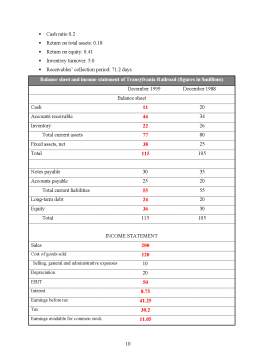Extras din proiect
A corporation is defined as a legal entity or structure created under the authority of the laws of a state, consisting of a person or group of persons who become shareholders. The entity's existence is considered separate and distinct from that of its members.
Not all business are corporations, small ventures or sole proprietorships are not corporations, they have different features, for example, they can be managed by a single individual. But when we speak about medium sized business or large business, almost all the time they are organised in corporations.
When a company is first established, its shares are held by a small group of investors, perhaps some managers and the shares are not publicly traded, the corporation its closely held. But after some time, if corporations need more resources and for get more capital, they are transformed in public companies and new shares are issued and widely traded.
Why are corporations so predominant in a market? Simply, because it is an extremely efficient way to engage in business. We will see down, a lot of advantages of corporations. I think the corporations are hardly little democracies, so their managers can make decisions quickly, and often ruthlessly, which is in stark contrast to the way economic decisions are made by legislatures.
All the corporations have some important features:
- we can consider a corporation like a real person who can enter into contracts, sue and be sued, pay taxes separately from its owners, and do the other things necessary to conduct business. The existence of a corporation is not dependent upon who the owners or investors are at any one time. Once formed, a corporation continues to exist as a separate entity, even when shareholders die or sell their shares. A corporation continues to exist until the shareholders decide to dissolve it or merge it with another business.
- they have limited liability, which protects them from incurring the debts or losses of the corporation beyond their initial contribution. If they buy €1000 of stock, they cannot lose more than their original investment and nobody can put them to pay more money to pay off its debts;
- and the owners of a corporation are not usually the managers and that gives to corporations permanence. This separations between ownership and management is an advantage for corporations because if managers quit or are dismissed and replaced, the corporation can survive.
My opinion is that the corporations have one major disadvantage: in some contries there is an extra tax on corporate profits. For an unincorporated business, any income after expenses is taxed as ordinary personal income. The corporation is treated differently in that corporate income is doubled taxed, first as corporate profits and then as individual income on dividends. Double tax can also occur if shareholders decide to sell their business. If the buyer purchases the corporation's assets, the profits from the sale may be subject to double tax. First, the corporation may pay tax on the gain. Next, sellers may pay tax on the money when they take it out of the corporation. The double taxation of corporations has been severely criticized by some economists in recent years, although most countries continue to find corporate income a convenient source of tax revenues. And an another disadvantage is managing a corporation’s legal machinery and communicating with shareholders can be time-consuming and costly.
For a good development on the market, a corporation need a lot of variety of real assets, which can be tangible like machinery, factories, offices, or computers and others intangible like software, technical expertise, trademarks. To get money for real assets usually a company sells financial assets such as bonds and stocks. Here it’s the moment were appear the financial manager who is like an intermediate between firm’s operations and the financial markets. The responsibilities of the financial manager can be separated into the investment, or capital budgeting, decision and the financing decision. He must know in which real assets should the firm invest in and how to raise the necessary cash. But also he must decide not only which assets their firm should invest in but also where those assets should be located, and when he track to raise the founds of the firm, from were to borrow, because are a lot of opportunities from other countries and he must choose the best convenient solution.
So, a financial manager it’s someone responsible for a significant investment or financing decision.
Usually, only in the smallest companies is a single person responsible for all this decisions, the treasurer. For this kind of firm, the treasurer is supposed to be the only financial executive, and he is responsible for raising new capital, maintaining good relations with banks, stockholders, and investors who hold the firm’s securities.
In all medium-sized business, corporations have a treasurer and a controller. The controller is someone who prepares the financial statements, manages the firm’s internal accounting, and looks after its tax obligations. So, the treasurer’s job is to obtain and manage the company’s financing, while the controller’s job is to confirm that the money is used correctly.
But in larger firms, they prefer to have a chief financial officer to supervise the treasurer’s and the controller’s work. The CFO is responsible for organizing and supervising the capital budgeting process, and he is implicated in corporate planning and financial policy.
Preview document
Conținut arhivă zip
- Finance and The Financial Manager - Financial Analysis and Planning.doc



















